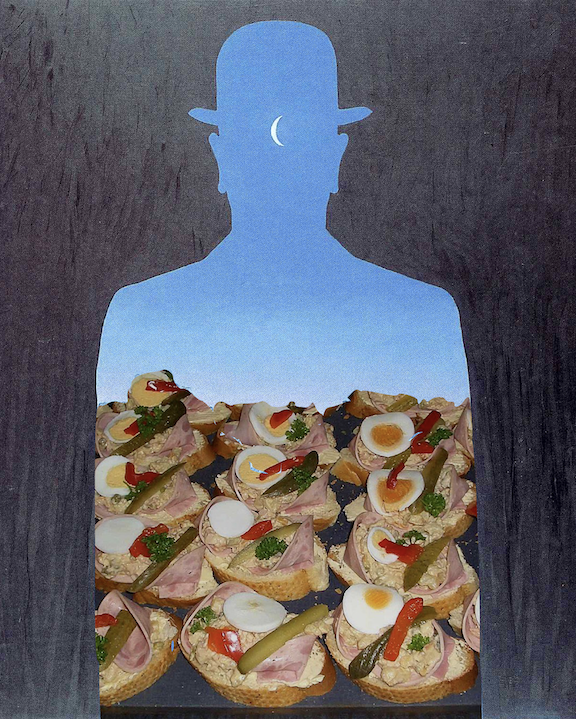Notable Sandwiches #127: Open-Faced

Welcome back to Notable Sandwiches, the movable-feast feature where my editor David Swanson and I pull up a chair at the strange table that is Wikipedia’s List of Notable Sandwiches and invite you to dig in. This week, more of a category than a sandwich: open-faced sandwiches, the concept.

An open-faced sandwich is a sandwich that forgot to put a top on. It’s a cornerstone of a lot of cuisines—notably Scandinavian, German, and Eastern European—but it’s a fungible concept, and there are plenty of exemplars on both sides of the Atlantic. (The open-faced Czech obložené chlebíčky and the more general “open” sandwich are back to back on the list, so we’ve combined them here.) Some say the open-faced sandwich’s precursor is the Medieval trencher, thick bread that served as a plate to sop up any juices at a banquet (“And when þe mete is vpe the amener shall take þe voyders wyth þe trenchors and broken brede.") Others point out that Virgil mentioned trenchers in the Aeneid a thousand years before then (“Their homely fare dispatch’d, the hungry band/Invade their trenchers next, and soon devour/To mend the scanty meal, their cakes of flour.”)
Scandinavians have enjoyed their nationally beloved dish known as smørrebrod, since the twelfth century or so—when they started putting Baltic herring atop rye. Historically, the open-faced sandwich is likely older than the sandwich proper itself. It is more economical of bread, for one thing. But as to its place in the constellation of sandwiches?
There’s certainly a potential epistemological angle to this—is it really a sandwich?—but as we’ve stated before, we travel strictly by the quixotic byways of the List of Notable Sandwiches, and anyway, we sort of exhausted the topic with the Great Hot Dog Debate. Besides, it’s boring. I’m not above a pointless fight, but debate for debate’s sake—particularly on an abstruse topic that will inevitably devolve into geometry—strikes me as being utterly bereft of joy.
And I’ll be honest: I could use some freakin’ joy.
The Sword and the Sandwich is a newsletter about deadly serious extremism and serious sandwiches. Please consider supporting this work with
a paid subscription.
It’s been a cold, grey, rainy spring here in New York, which ordinarily I’d relish as I can’t abide the oppressive mugginess that blankets the city in armpit stench for the months that pass as summer here. But on top of a relentless torrent of bad news, and some difficult personal stuff, and the perennial struggle of getting my unruly brain to produce startling and exciting words in exchange for 5% of my audience paying five dollars a month for them (and incidentally, marshalling the chutzpah to demand money for my words in the first place) … things have been rough. I think they’ve been rough for a lot of us! There’s just so much bad stuff happening, and although there is much to be said for the many laudable actions people are taking to counter it—from in-person protest to relentlessly contacting their representatives to other quieter organizing to the simple generous exchanges of mutual aid—a certain feeling of powerlessness or quiet despair is hard to avoid.
I do think, truly, that quiet despair alchemizes into something else when you share it. It’s an emotion particularly suited to modern American atomization. There’s a uniquely benumbing quality to continuing to live your small, private life while tectonic, malevolent shifts occur, so that you have to keep marching as the ground surges nauseatingly under you. There’s a surrealness to it. And a tremendous loneliness. You assume everyone else around you has got all their shit together, is the full sandwich, while you’re the only lonely piece of bread. There’s a herring on your head, but they’re OK, they’re keeping it together, what’s wrong with you? And everyone else is feeling just the same way, but hiding it as hard as they can. Everyone hiding all that pain from each other! Pretending the other piece of bread is just about to arrive. But there’s nothing wrong with an open-face sandwich. Or honesty about how hard it is to be doing all right (or pretending to be doing all right) when nothing is all right. Maybe we could all do with being a bit more open-faced about it.

The writer John Cheever is sort of the bard of this kind of American despair (although he mostly writes about it in the context of wealthy, white, exurban, hard-drinking families on the Metro-North lines), and a particularly astute writer on the subject of loneliness. (His most famous short story, “The Swimmer,” is the quasi-surreal journey of a man who decides to swim home one sunny afternoon via his neighbors’ pools, but swims through time and disaster instead, and returns to an empty home with rusty gutters.)
In his masterpiece of a novel The Wapshot Scandal—one of my favorite books, and even better than his very good short stories—a main character has a breakdown this way: “And as she stood there in the dark it seemed that the furies attacked Betsey; that through every incident—every moment of her life—ran the cutting thread, the wire of loneliness, and that when she thought she had been happy she had only deceived herself… ” And a traveler at a hotel thinks: “he felt from the hard mattress where he lay an accrual of loneliness from the thousands like himself who had lain there, hankering to not be alone. He turned off the light, slept and dreamed of swans, a lost suitcase.” It’s a book of tremendous solitude. One wants to shake these WASPs, demand they unburden themselves to one another. But it is not possible. The finger sandwiches have to stay arranged, the face closed, and this is part of what creates loneliness in the first place.
Of course, I’m not saying that laying down our sorrows—opening our true faces to one another—would dissipate them entirely. They are, after all, reactions to real and ongoing forces. Feelings are information, as much as anything else. But I do think that the delusive striving to retain normality—to seem collected—is as much a strain on us as anything else in this moment. Often, pretending you are not feeling something is harder even than facing the feeling itself. And so if there is a time, a possibility, to reveal to a sympathetic human listener that one is an open-faced creature of this earth with a herring on one’s head—a solitary being who is burdened and troubled—then one should.

If I close my eyes, I can dream up a wind coming up from the Baltic, and it smells like salt, like the juniper and limestone of Stora Karlsö island off Sweden's eastern shore. It carries the squabbling of guillemots. The legendary Norwegian writer Knut Hamsun, in his seminal novel Hunger, has his troubled main character put it this way: “I forget where I am, and pose like a solitary beacon on a rock in mid-sea, whilst the tides rush and roar about it.” You, too, are not alone in the loneliness cutting through you like a wire. Open your face.

-
Nice inclusion of Hamsun's "Hunger", to which I would also add George Orwell's "Keep the Aspidistra Flying" tugging at those loose threads.
Just another note in the rocky cairn of...The Twilight Zone
Add a comment: